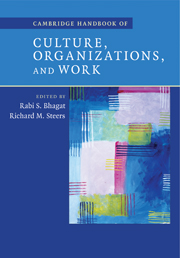Book contents
- Frontmatter
- Contents
- List of figures
- List of tables
- List of contributors
- Preface
- PART I CULTURAL FOUNDATIONS
- PART II CULTURE AND ORGANIZATION THEORY
- PART III CULTURE AND ORGANIZATIONAL BEHAVIOR
- 9 Understanding leadership across cultures
- 10 Global leadership: progress and challenges
- 11 The role of cultural elements in virtual teams
- 12 Cultural drivers of work behavior: personal values, motivation, and job attitudes
- 13 Interdisciplinary perspectives on culture, conflict, and negotiation
- 14 The complexity of trust: cultural environments, trust, and trust development
- 15 Cultural variations in work stress and coping in an era of globalization
- 16 Cultural values and women's work and career experiences
- 17 Intercultural training for the global workplace: review, synthesis, and theoretical explorations
- PART IV FUTURE DIRECTIONS IN THEORY AND RESEARCH
- Index
17 - Intercultural training for the global workplace: review, synthesis, and theoretical explorations
Published online by Cambridge University Press: 15 December 2009
- Frontmatter
- Contents
- List of figures
- List of tables
- List of contributors
- Preface
- PART I CULTURAL FOUNDATIONS
- PART II CULTURE AND ORGANIZATION THEORY
- PART III CULTURE AND ORGANIZATIONAL BEHAVIOR
- 9 Understanding leadership across cultures
- 10 Global leadership: progress and challenges
- 11 The role of cultural elements in virtual teams
- 12 Cultural drivers of work behavior: personal values, motivation, and job attitudes
- 13 Interdisciplinary perspectives on culture, conflict, and negotiation
- 14 The complexity of trust: cultural environments, trust, and trust development
- 15 Cultural variations in work stress and coping in an era of globalization
- 16 Cultural values and women's work and career experiences
- 17 Intercultural training for the global workplace: review, synthesis, and theoretical explorations
- PART IV FUTURE DIRECTIONS IN THEORY AND RESEARCH
- Index
Summary
Globalization has led to increased interconnectedness among nations and we are much more interdependent than we were in the past. This interdependence requires us to work with people from different cultures, and it also requires many of us to live in cultures far away and quite different from our own. Despite the similarities offered by technology and urban centres, differences persist, and the vision of a homogeneous world is quite unlikely and perhaps flawed. The variety of religions and languages present in the world today offers ample evidence that, if anything, humankind loves diversity. So we need to prepare ourselves to have a meaningful dialogue with people from different cultures to help each other solve our problems and also to learn from each other. Intercultural training as a field of research has become all the more relevant in today's shrinking world.
Just like we are all lay social psychologists, all of us interculturalists, those who have spent some time away from home in a foreign culture, are also lay intercultural trainers – we can teach what we have learned just like any other knowledge or skill. However, since intercultural training has developed a rich literature as an academic discipline, which is grounded in theory, it offers opportunity to researchers and professionals to provide a systematic approach to developing, implementing, and evaluating intercultural training programs. This chapter intends to contribute to the extant literature by providing a theoretical framework for the systematic development of intercultural training programs, which can be used both in professional training and academic courses.
- Type
- Chapter
- Information
- Cambridge Handbook of Culture, Organizations, and Work , pp. 462 - 488Publisher: Cambridge University PressPrint publication year: 2009
- 27
- Cited by

